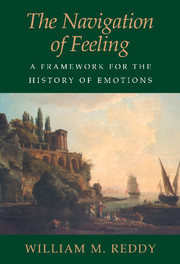Book contents
- Frontmatter
- Contents
- Preface
- Part I What are Emotions?
- 1 Answers from Cognitive Psychology
- 2 Answers from Anthropology
- 3 Emotional Expression as a Type of Speech Act
- 4 Emotional Liberty
- Part II Emotions in History: France, 1700–1850
- Conclusion
- Appendix A Detailed Review of Anomalous Cases from the Gazette des Tribunaux Sample
- Appendix B Detailed Review of Anomalous Cases from the Tribunal Civil de Versailles Sample
- References
- Index
4 - Emotional Liberty
Published online by Cambridge University Press: 07 September 2009
- Frontmatter
- Contents
- Preface
- Part I What are Emotions?
- 1 Answers from Cognitive Psychology
- 2 Answers from Anthropology
- 3 Emotional Expression as a Type of Speech Act
- 4 Emotional Liberty
- Part II Emotions in History: France, 1700–1850
- Conclusion
- Appendix A Detailed Review of Anomalous Cases from the Gazette des Tribunaux Sample
- Appendix B Detailed Review of Anomalous Cases from the Tribunal Civil de Versailles Sample
- References
- Index
Summary
The concept of emotives elaborated in Chapter 3, developed in response to a range of problems encountered by researchers on emotions, has broad implications for the understanding of social life and politics. The present chapter offers a preliminary exploration of these implications. They will be spelled out in greater detail in Part II, which examines a specific period of political and social change.
Researchers on emotions in fields other than anthropology have frequently neglected the political implications of their work. Psychologists have had very little to say on this issue. Philosophers and historians who have written on emotions in recent years have often expressed only tangential interest in the political dimension of their ideas (e.g., Solomon 1984, 1992; De Sousa 1987). Speech act theorists have, for the most part, treated their subfield as a highly technical one, concerning language and intention, requiring no exploration of political issues. A number of philosophers, historians, and literary critics concerned with gender have recognized the political implications of the West's gendered conception of emotions (e.g., Greenspan 1988; Jaggar 1989; DeJean 1991; Schiesari 1992; Burack 1994; Roper 1994; Pinch 1996 – in addition to the anthropologists mentioned in Chapter 2). But these observers have focused their attention too much on redressing this imbalance and too little on the larger implications of the whole mental ontology their work has put into question.
Anthropologists represent an important exception to the general aversion to politics displayed by researchers on emotions.
- Type
- Chapter
- Information
- The Navigation of FeelingA Framework for the History of Emotions, pp. 112 - 138Publisher: Cambridge University PressPrint publication year: 2001

